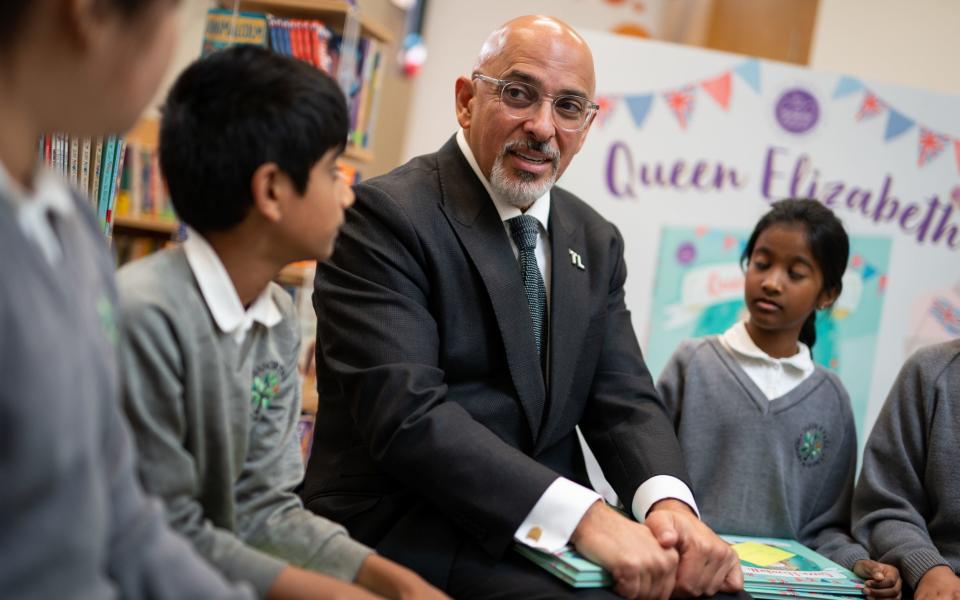Nadhim Zahawi was the ultimate Westminster fixer, felled by his own success

Like so much in contemporary politics, the rise and fall of Nadhim Zahawi has occurred at an accelerated, once unimaginable, tempo.
After securing his first government job, as Schools minister in 2018, his career soared at a rate only outdone by the vertiginous pace of its decline. He leapt from role to role like a frog from lilypad to lilypad, his feet barely touching down: Schools minister, Business minister, vaccine rollout supremo, Education Secretary, Chancellor of the Exchequer, Chancellor of the Duchy of Lancaster, Chairman of the Conservative Party - all in just four short years.
Amid this hi-tempo manoeuvring, then, it is an irony that his sudden downfall has come as the result of a tax scandal rooted in financial dealings almost 20 years old - and a full five years before he even entered parliament. With his sacking by Rishi Sunak, a time-bomb on a very slow fuse has detonated beneath one of Westminster’s fastest movers and shakers. It has derailed the career of a fixer whose pragmatism and connections brought him success in both business and politics - but who found the latter ultimately undone by the former. His downfall is already being lamented. “He was always evidence based. He would always consider an argument,” one former colleague notes. “He was willing to compromise to get things done.”
In retrospect, he reached his zenith six months ago, when on Tuesday July 5 he was promoted Chancellor by Boris Johnson after the resignation of Rishi Sunak. Johnson had previously appointed Zahawi to the role which had made his name - overseeing the nationwide vaccination programme - and here seemed reward for a job well done. Yet within 48 hours, on Thursday of the same week, Zahawi had thrown his lot in with the growing band of ministers calling for Johnson to go. If it seemed a barely believable volte face, Zahawi did not blush. Shuffle forward another two days and he was announcing his own candidacy for Tory leader.

Yet even as the situation became terminal for Johnson, the seeds of Zahawi’s own demise were beginning to bloom. On the same day as he announced his leadership bid, it was reported that he was being investigated by HMRC over his tax affairs. He defended himself that weekend, saying he was "clearly being smeared” and “I’ve always paid my taxes.” But it turned out that in the two short months he was at the Treasury, he agreed a settlement with HMRC amounting to almost £5m, including a £1.1m fine, for a “careless and not deliberate error”. Though he tried to weather the storm, rescuing his political life proved to one deal that the Tory chairman - prized for his organisational skills in advance of the next election - could not broker.
It was not just his ability that allowed him to believe he could cling on, those close to him say. Zahawi could be stubborn on points of principle. “He obviously believes he’s done the right thing,” says one Westminster source who has worked with him closely. It is still widely remembered in Parliament that, in 2012, he was among rebels who defeated Coalition plans to transform the Lords into an elected chamber despite the obvious harm it would do his prospects under David Cameron.
So it proved. While others who arrived as an MP in Westminster in 2010 - like Liz Truss - quickly won promotion, Zahawi had to wait eight years for his first junior post. Yet that delay, says sources, actually helped him find friends and allies. Unlike Truss, or Johnson, “he didn’t sail through. He got to know backbench colleagues. It was a useful tool,” says a source. And making connections was always one of Zahawi’s most useful talents.
Popularity won then may also have helped him when he faced repeated calls to resign, as did another chief quality. “He is resilient,” says a source. “He hasn’t had the typical life of a politician. Coming to this country without speaking a word of English… it makes you tough.”

His story in Britain began in 1978, when as an 11-year-old he followed his father, Hareth, from Baghdad to Britain. Warned he was about to be targeted by Saddam Hussein’s regime, Hareth packed and fled for London overnight. The Zahawis were influential Kurds, the ethnic group which dominates the oil-rich north of Iraq, but such influence could not protect them from the attentions of Hussein, who always viewed Kurds with suspicion and, a decade after the Zahawis fled, went so far as to gas them at Halabja, killing thousands.
Zahawi quickly picked up English and was privately educated. But his family suffered an enormous financial reverse when he was 18, after his father invested in an American firm which went bankrupt. Nadhim was about to become a minicab driver, so the story goes, when his mother pawned her jewellery so he could go to University College London to study chemical engineering.
If the episode proved a powerful shock, what Zahawi calls his father’s “mad entrepreneur” spirit endured in him. After graduation he proved his wheeler-dealer flair, selling clothes and toys to high-street retailers. Soon, he had his start in politics too, when he teamed up with Tory deputy chair and future mayoral candidate, Jeffrey Archer, helping the grandee with his controversial “Simple Truth” campaign in aid of Iraqi Kurds. Back in the UK, Archer helped Zahawi gain a seat on Wandsworth Council.
In 1999, the pair teamed up again, when Zahawi worked on Archer’s bid to become London mayor. Yet if the campaign ended in failure for Archer, it proved pivotal to Zahawi’s own success, for it was there that he met Stephan Shakespeare, with whom, just a year later, he founded the polling company YouGov. In 2005 the business went public, with a 42.5pc founder’s stake registered not to Zahawi himself, but to Balshore, a company registered in Gibraltar and controlled by his father. It is the subsequent sale of that stake, for £27m, that has led all these years later to Zahawi’s tax troubles.
In the interim, though, he got richer still, investing in property now worth almost £60m, acquiring a Belgravia mansion and a home and livery yard in his constituency of Stratford-upon-Avon.
Even as YouGov prospered, the identity that had been so perilous in childhood was beginning to prove profitable. Zahawi returned to Baghdad, according to the FT, delivering on contracts secured by his father with Iraq’s interim government after the US-led invasion of 2003 had toppled Hussein.
Business in Iraq endured even while still a relatively new MP. He set up a consultancy, Zahawi & Zahawi Ltd, to advise oil companies looking to work in Iraq’s Kurdish north. It is a part of the world where personal connections and recommendations carry particular weight.
The FT reports that by 2015 Zahawi was chief strategy officer at Gulf Keystone, which operated the Shaikan oilfield, one of largest in northern Iraq. Two years later, Zahawi was being paid almost £30,000 a month by the company, and also received a £285,000 leaving bonus. For an oil company which had struggled to get paid on time by the regional government, Zahawi proved a godsend. Suddenly the cash started flowing as easily as the oil.
Though bribery and corruption have played a role in Iraqi oil exploration, there is no suggestion that Zahawi did anything wrong, nor that his constituency work suffered. Rather, his time there cemented his reputation as a man able to get things done. It was a talent fusing organisational and management abilities with business experience and personal connections, first attested to by Archer many years before.
In November 2020, however, it was put to the test as never before, when Boris Johnson called on him to run the vaccine rollout, perhaps the most significant job in the country given the lives at stake, despite Zahawi still being a relative unknown. Zahawi called it “the biggest job I will ever do for the country that has given me and my family everything”. He likened the task to building the “equivalent of the infrastructure of a national supermarket chain” in a matter of months, and then “growing it by 20pc every week”.

It was also a job he was made for, say sources and colleagues - founded on data-driven, behind-the-scenes negotiations with impatient pharmaceutical executives who, as a businessman himself, Zahawi was able to build a rapport with. “He’s a very talented person who has outside experience,” says one source. “He could understand the calculations pharma execs were having to make, which other ministers wouldn’t have been able to.” There were other differences too. “He’s organised and focused in a way that many politicians aren’t.” And though “he likes seeing results” he did not display, says one who worked closely with him, “a temper. Always courteous to staff. You won’t see them now but he even had good cross-party relations. He wasn’t tribal.”
So it is not academic interest, says the former colleague, but Zahawi’s “life journey and business experience” which have made him “a proper Conservative” - someone who instinctively believes in “the power of free markets to transform lives for the better. He’s not an ideologue.”
It all seemed such a perfect union: Zahawi prospering as a Conservative, and the Conservatives prospering through him. “His story is one that’s good for the Conservatives,” says a source. So were his talents as a wrangler, a deal-maker, a connector, and a fixer. In a party already on the back foot, where loyalty, strategy and unity are in short supply, such qualities will be sorely missed.

 Yahoo News
Yahoo News 
